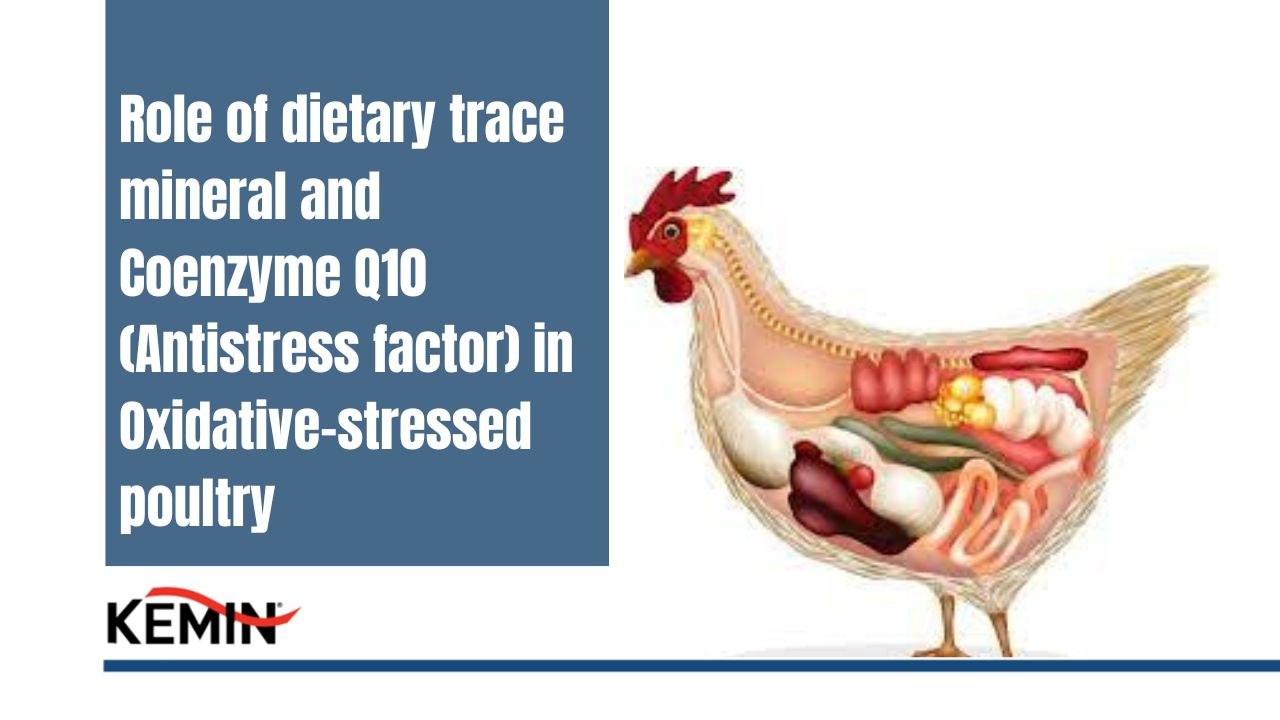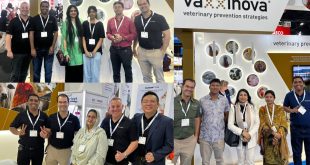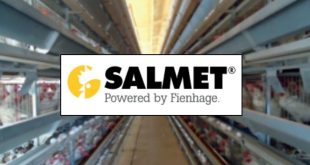 Dr. Md. Emdadul Haque, Dr. Venket M Shelke, Dr. Partha Das, and Dr. Prateek Shukla (Kemin Industries South Asia Pvt. Ltd.) : Optimizing performance in poultry production requires constant vigilance against a silent threat: oxidative stress. This condition arises when the body’s natural antioxidant defenses struggle to neutralize free radicals, unstable molecules formed during normal cellular processes, and environmental exposures. Excess free radicals wreak havoc by damaging cells, tissues, and organs, ultimately impacting overall bird health and performance.
Dr. Md. Emdadul Haque, Dr. Venket M Shelke, Dr. Partha Das, and Dr. Prateek Shukla (Kemin Industries South Asia Pvt. Ltd.) : Optimizing performance in poultry production requires constant vigilance against a silent threat: oxidative stress. This condition arises when the body’s natural antioxidant defenses struggle to neutralize free radicals, unstable molecules formed during normal cellular processes, and environmental exposures. Excess free radicals wreak havoc by damaging cells, tissues, and organs, ultimately impacting overall bird health and performance.
Why Focus on Oxidative Stress Now?
Erratic weather patterns, characterized by sudden downpours, fluctuating temperature, and humidity, pose a significant threat. These conditions create a perfect storm for oxidative stress in poultry due to several factors:
- Rapid Environmental Changes: Sudden temperature swings and heavy rain disrupt birds’ physiological homeostasis, increasing free radical production.
- Immune System Activation: Erratic weather patterns can trigger an inflammatory response, generating free radicals as signaling molecules.
- Oxidative Shock Response: High temperatures activate a cellular defense mechanism called the oxidative shock response, generating free radicals.
- Disrupted Cellular Function: Excessive oxidative stress disrupts normal cellular function, leading to leakage of cellular components that form free radicals.
- Wet Litter Conditions: Heavy rains and gastrointestinal insults leading to abnormal droppings, create damp litter, promoting not only coccidiosis oocyst sporulation but also bacterial and mold growth, and exacerbating oxidative stress.
Combating Oxidative Stress: The Approach
Commercial poultry producers can employ a multi-faceted approach to mitigate the risk of oxidative stress in their flocks:
- Reducing Free Radical Production:
A- Diet Management:
- Balanced Nutrition: Provide diets with essential vitamins (vitamin E, B vitamins) and minerals (selenium, manganese, zinc).
- Optimum Energy Levels: During oxidative stress periods, consider diets with lower energy densities.
B- Environmental Control:
- Temperature Regulation: Implement proper ventilation and cooling systems.
- Litter Management: Maintain dry litter conditions to minimize stress and prevent bacterial and mold growth. Usage of ammonia binders is also recommended during severe winter conditions.
- Enhancing Antioxidant Defenses:
A- Dietary Supplementation:
- Antioxidant Additives: Incorporate feed additives rich in antioxidants like vitamin E, organic selenium, or plant extracts.
- Breeding Programs: Genetic Selection: Implement selective breeding programs for improved thermotolerance and stronger antioxidant defense systems.
Role of trace mineral and Coenzyme Q10 in mitigation of oxidative stress
Zinc (Zn)
Zinc, a key component of the carbonic anhydrase enzyme, improves eggshell weight and reduces shell defects. It is crucial for maintaining an efficient immune system during oxidative stress, as it increases antibody titer, Immunoglobulin G & Immunoglobulin M (IgG & IgM), and cell-mediated immunity.
Zinc aids in quenching free radicals by participating in antioxidant enzyme systems like superoxide dismutase (SOD) and metallothionein. It also releases enzymes like catalase (CAT), glutathione peroxidase (GPx), vitamin A, and vitamin C, which raises their levels in the serum and makes it easier for the body to deal with oxidative stress.
Copper (Cu)
Copper (Cu) is a crucial trace mineral in birds, essential for antioxidant activity and immunity. Birds require 5-8 ppm of copper in their diet. Oxidative stress can decrease copper intake due to reduced feed intake, leading to marginal copper deficiency. This impairs the immune system, reducing T lymphocyte synthesis, antibody production, and phagocytic index. Cu supplementation during oxidative stress can help birds cope with the stress efficiently and maintain the eggshell and shell membrane quality in layer.
Selenium (Se)
Selenium has a vital function in poultry’s antioxidant defense system during oxidative stress. Organic selenium is more bioavailable than inorganic forms in chicken. It boosts weight gain and feed efficiency in oxidative-stressed birds while improving feed conversion, egg output, egg quality, haugh units, and eggshell quality in layers raised at high temperatures. It protects the mucosa of the small intestine and pancreas from oxidative damage during oxidative stress, enhances vitamin E absorption, and protects cell membrane fats from oxidative damage. It also aids immune systems by increasing antibody titer (IgG and IgM), interleukin production (Tumour Necrosis Factor-alpha (TNF-α), Interferon-gamma (INF-γ) and interleukin-2(IL 2)), and phagocytic functions of macrophages, thereby reducing the negative effects of oxidative stress.
Chromium (Cr)
Chromium (Cr) is a mineral involved in the metabolism of carbohydrates, proteins, lipids, and nucleic acids through insulin action. Chromium supplementation enhances insulin, glucose, and cholesterol levels in oxidative-stressed birds by restoring the Cr reservoir and utilizing glucose extensively. It reduces oxidative stress, lipid peroxidation, hepatic nuclear protein, and oxidative shock protein expression in oxidative-stressed layers. Organic chromium has more bioavailability and lower toxicity than inorganic forms. Chromium supplementation in birds reduces stress by increasing orexin and glucose transporter (GLUTs) levels and reducing nuclear factor kappa B(NF-κB) and oxidative shock protein (HSPs) levels, promoting a more thermoneutral physiology.
Manganese (Mn)
Manganese (Mn) aids in carbohydrate and lipid metabolism by increasing insulin synthesis from the pancreas. In oxidative-stress conditions, Mn supplementation can alleviate its negative effects on broilers, particularly in chronic oxidative-stressed broilers, by reducing abdominal fat deposition by decreasing lipoprotein lipase (LPL) activity. Supplementation of Mn can protect the embryo of birds from maternal oxidative stress by enhancing epigenetic-activated antioxidant and anti-apoptotic activities. It acts as a cofactor for many of the enzymes required for eggshell synthesis and helps maintain eggshell quality during oxidative stress conditions.
Iodine (I)
The thyroid gland hormones in birds significantly regulate metabolic and thermogenic functions. Oxidative stress can decrease thyroid hormone concentrations in the circulatory, potentially due to a decrease in feed intake. Oxidative-stressed layers have lower serum Triiodothyronine (T3), Thyroxine (T4,) and Thyroid stimulating hormone (TSH) concentrations, as well as an increase in Adrenocorticotropic hormone (ACTH) concentrations, and there is a direct correlation between plasma T3 concentration and egg productivity. The amount of iodine influences thyroid gland function in the diet and Iodine deficiency at this stage may prove harmful to poultry. Iodine deficiency can cause metabolic disorders and reduced laying rates. The recommended iodine content for layers’ diet should be 0.48 mg/kg of feed.
Iron (Fe)
Iron (Fe) is an essential mineral that is regularly supplemented in poultry feed. It is a vital component in various enzymes and proteins that regulate cell development, oxygen transport, and health. It is involved in biochemical reactions like the antioxidant system, by being part of enzymes like catalase, and various oxidation-reduction reactions, and is essential for the immune response. It significantly supports enzymes in the tricarboxylic acid cycle (TCA), enabling the removal of harmful metabolites via catalases and peroxidases with iron. Oxidative stress reduces Fe levels in serum and tissue, leading to immune and antioxidant system malfunction, causing health issues in birds. Birds under oxidative stress should consume a normal dietary iron concentration; otherwise, the immuno-antioxidant system collapse will negatively impact animal health.
Coenzyme Q10 (CoQ10)
Coenzyme Q10 (CoQ10), also known as ubiquinone, is a lipophilic antioxidant found in the mitochondria of all body cells. It has various homologs based on an isoprenoid moiety, with CoQ10 being prominent in humans and birds. It serves as an electron carrier in the mitochondrial respiratory chain and a lipid-soluble antioxidant. It is an important bioactive compound that can strongly remove free radicals from cells. The body synthesizes it, but excessive free radical scavenging during oxidative stress depletes it. CoQ10 can be used as a nutritional supplement for various beneficial effects, including:
- CoQ10 significantly enhanced the performance (body weight gain, feed intake, and F: G ratio) of broilers, particularly the grower and finisher stage in oxidative stress conditions.
- CoQ10 lowered the levels of glucose, cholesterol, triglycerides, and corticosterone in the blood, which is a key biomarker for oxidative stress. This could be because CoQ10 reduces the oxidative effects of oxidative stress.
- T3, T4, and their balance control animal body temperature and metabolic activity. Oxidative-stressed birds consistently have decreased T3 and T4 concentrations. CoQ10 enhanced T4 concentrations in blood serum, demonstrating its capacity to reduce the deleterious effects of oxidative stress.
- Oxidative stress in broiler chickens increases the H/L ratio index, affecting the number of lymphocytes and heterophiles. CoQ10 supplementation can decrease the H/L ratio, potentially reducing its harmful effects.
- Broiler chicken’s susceptibility to ascites (pulmonary hypertension syndrome)) is reduced by CoQ10 supplementation, which improves hepatic mitochondrial function, respiratory chain-related enzyme activities, and mitochondrial antioxidative activity.
- Dietary CoQ10 significantly increased hepatic CoQ10 levels in laying hens, and it acts as an HMGR (hydroxymethyl-glutamyl-CoA reductase) inhibitor in the livers, suppressing cholesterol synthesis, which in turn results in a reduction in egg yolk cholesterol.
- Dietary CoQ10 supplementation may increase tissue concentrations, which may restore mitochondrial functions and regulate Pdss2 (decaprenyl-diphosphate synthase subunit 2), BMP15 (bone morphogenetic protein 15), and GDF9 (growth differentiation factor 9) mRNA transcripts, improving oocyte quality and broiler breeders’ incubated eggs’ hatchability.
- Coenzyme Q10 plays a crucial role in the regeneration of antioxidants like superoxide dismutase and vitamin E. As a result, these antioxidants improve sperm quality and prevent lipid peroxidation in the sperm plasma membranes of male broiler breeders.
Kemtrace® Supreme
Kemtrace® Supreme is a highly bioavailable complete organic mineral mix of Metal Propionates ensuring optimal mineral nutrition to broiler, layer, and breeder birds and reducing oxidative stress to enhance absorption.
- IOMPS- State-of-the-art Manufacturing: Kemin’s Metal Propionates are manufactured in the new Integrated Organic Mineral Production System; With more stable minerals and better mineral complex formation.
- A fully Organic formulation: Zn, Mn, Cu, Co, Cr in Metal Propionates form; Iron as Iron Ascorbate; Selenium as Se Yeast; Iodine as EDDI
- Optimized Mineral concentration: All the minerals are optimized to fulfill the nutrient requirement; Higher Zn, Mn, and Cr concentrations to fit the needs of Broiler, Layer, and Breeders.
- Boosted with Antistress Factors: Coenzyme Q 10 (Antistress factor) is added to reduce oxidative stress; higher Chromium concentration to reduce stress, boost immunity, and increase meat yield.
Conclusion
Oxidative stress poses a significant threat to the poultry industry. This multifactorial condition arises from factors such as fluctuating temperatures, humidity, nutrient imbalances, and metabolic stress. Combating oxidative stress in poultry requires a comprehensive approach. While no single strategy can fully mitigate its effects, trace minerals and Coenzyme Q10 play a crucial role in reducing oxidative damage and promoting overall bird health. This is particularly important in South Asia, where open housing systems and challenging environmental conditions exacerbate the risk of oxidative stress. By supplementing with these essential nutrients, poultry can better withstand oxidative stress and maintain optimal performance.
References are available upon request.
 Agrinews24 কৃষির সাথে, কৃষকের পাশে
Agrinews24 কৃষির সাথে, কৃষকের পাশে





















